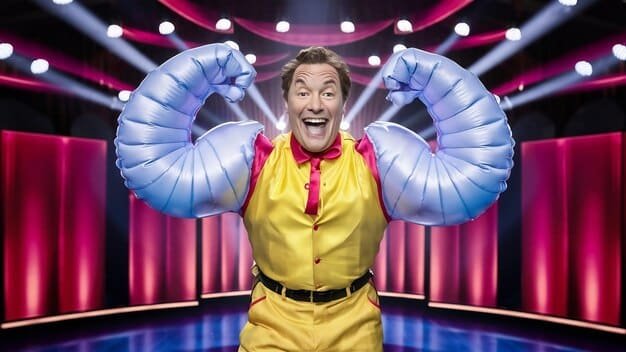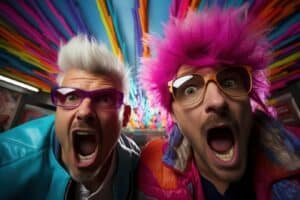
Comedy Show TV
Television has long been home to some of the most beloved, outrageous, and enduring characters in entertainment. Comedy, in particular, has produced a vast array of unforgettable personalities who have brought laughter to millions of viewers around the world. Whether through their quirky behavior, memorable catchphrases, or unique worldviews, these characters have etched themselves into the cultural fabric and left a lasting impact on pop culture. From sitcoms to sketch shows and stand-up specials, comedy TV characters continue to captivate audiences, becoming more than just fictional personalities but icons in their own right.
In this article, we’ll explore some of the most iconic comedy show TV characters of all time—characters whose charm, humor, and eccentricities have ensured their place in TV history. These characters have not only entertained audiences but also shaped the landscape of television comedy.
Key Takeaway
Iconic comedy TV characters reflect universal human traits.
Whether it’s George Costanza’s neuroticism, Michael Scott’s cringeworthy attempts at leadership, or Lucy Ricardo’s slapstick antics, the characters who endure the longest in TV history tend to embody a mix of universal traits—insecurities, ambition, love, and the ability to laugh at themselves. These relatable qualities allow audiences to connect with them on a deeper level.
Comedic timing and strong performances make these characters unforgettable.
While the writing for these iconic characters is crucial, the actors’ performances are what truly bring them to life. Lucille Ball’s slapstick genius, Steve Carell’s awkward vulnerability, and Jim Parsons’ delivery as Sheldon Cooper showcase how the right actor can elevate a character from funny to legendary.
These characters often challenge societal norms.
From Archie Bunker’s controversial views in All in the Family to Sheldon Cooper’s social awkwardness in The Big Bang Theory, many iconic comedy characters challenge or upend societal expectations. Their flaws, eccentricities, and unconventional behavior push boundaries, sparking conversations about deeper societal issues through humor.
Comedy TV characters have a lasting cultural impact.
Many of these characters have transcended the TV screen and entered the broader cultural lexicon. Catchphrases like “D’oh!” (Homer Simpson) and “Bazinga!” (Sheldon Cooper) have become part of everyday conversations, illustrating how deeply these characters have influenced pop culture.
Iconic comedy characters evolve over time.
What makes these characters enduring is their development throughout their shows. From the growth of Michael Scott from a clueless boss to a more emotionally mature character in The Office, to Homer Simpson’s evolving father figure role, the changes in these characters keep them fresh and relatable, ensuring their place in TV history.
These key takeaways highlight the complexity, influence, and enduring appeal of the most iconic comedy characters in television.
Lucy Ricardo – “I Love Lucy”
Show: I Love Lucy
Actor: Lucille Ball
Lucille Ball’s portrayal of Lucy Ricardo in I Love Lucy is nothing short of legendary. The Comedy Show TV, which originally aired from 1951 to 1957, broke new ground in television history. Lucy, the fun-loving, scheming housewife with a flair for getting herself into ridiculous situations, quickly became one of the most iconic TV characters of all time. Her physical comedy, impeccable timing, and slapstick humor were key to the show’s success.
Also Read : The Best Comedy Shows In Chicago For A Night Of Laughter
Lucy’s appeal was universal—she was both lovable and flawed, a reflection of the real-life struggles of women during the 1950s. Whether she was hilariously failing at a job, trying to impress her husband Ricky, or getting into wacky shenanigans with her best friend Ethel, Lucy’s antics never failed to deliver laughs. Her ability to create comedy out of mundane situations set the stage for many sitcoms that followed.
Also Read : The Best Couple Dance Styles For Every Personality And Occasion
Legacy: Lucy Ricardo paved the way for women in television comedy and has influenced countless actresses who followed in her footsteps.
Also Read : How To Choose The Best Comedy Show For Your Next Night Out
Archie Bunker – “All in the Family”
Show: All in the Family
Actor: Carroll O’Connor
Archie Bunker, the bigoted, working-class patriarch of the Bunker family, was both a figure of ridicule and a reflection of the societal tensions of the 1970s. All in the Family, which aired from 1971 to 1979, was a groundbreaking sitcom that tackled tough issues such as race, gender, and class, and Archie was at the heart of that commentary. He was often offensive, but his flawed nature made him a compelling character.
Also Read :Top 10 Websites For Online Dance Lessons You Need To Try
Archie’s unapologetic attitude toward social issues sparked controversy but also opened up important conversations on television. Despite his prejudices, Archie’s vulnerability and love for his family made him a complex and, at times, sympathetic character. The sitcom’s success was in large part due to Carroll O’Connor’s portrayal of Archie, turning what could have been a one-dimensional character into a multi-faceted, unforgettable icon.
Also Read : The Future of Earning: How AI And Automation Are Changing Jobs
Legacy: Archie Bunker remains one of the most significant characters in TV history, paving the way for more complex, flawed characters in sitcoms.
George Costanza – “Seinfeld”
Show: Seinfeld
Actor: Jason Alexander
George Costanza, portrayed by Jason Alexander, is a character who has become synonymous with neurotic, self-deprecating humor. As a central figure on Seinfeld, George’s perpetual state of anxiety, insecurity, and failure made him the perfect foil to Jerry Seinfeld’s laid-back persona. George was known for his eccentric behavior, outlandish lies, and inability to hold down a job or relationship, yet somehow managed to survive with an endless supply of comedic one-liners.
One of the things that made George so iconic was that he was, in many ways, the anti-hero. He was selfish, deceitful, and often dishonest, yet viewers couldn’t help but root for him. His character was the epitome of “everyman” in the sense that he was a constant failure but always managed to escape with minimal consequences. His antics and ridiculous schemes have remained a staple of comedic television for decades.
Legacy: George Costanza has become the archetype of the neurotic, insecure character, influencing a generation of comedic TV roles.
Michael Scott – “The Office”
Show: The Office
Actor: Steve Carell
Michael Scott is a character who broke the mold for television bosses. Played by Steve Carell, Michael was the bumbling, inappropriate, and often painfully clueless regional manager of Dunder Mifflin’s Scranton branch. Despite his many shortcomings, Michael was also surprisingly lovable. He craved validation, desperately sought friendship, and often made a fool of himself in his attempts to connect with his employees.
The beauty of Michael Scott’s character lies in how Steve Carell managed to blend humor with genuine emotional depth. While Michael’s behavior often led to cringeworthy moments, the show also revealed his insecurities and need for affection, making him a tragicomic figure. His eccentricities, misguided attempts at humor, and ultimate growth throughout the series helped elevate The Office into one of the most beloved sitcoms of all time.
Legacy: Michael Scott’s character is often cited as one of the best television characters of all time, making Steve Carell a comedy legend in his own right.
Homer Simpson – “The Simpsons”
Show: The Simpsons
Actor: Dan Castellaneta
As the patriarch of the longest-running animated sitcom in television history, Homer Simpson is an undeniable icon. Voiced by Dan Castellaneta, Homer has been at the center of The Simpsons for over three decades. Homer is a lovable, but often lazy, oblivious, and foolish father who somehow manages to bumble his way through life while still managing to keep his family together.
What makes Homer Simpson so enduring is the depth of his character despite his apparent simplicity. He’s an everyman with ridiculous dreams and schemes, often failing but never losing his optimistic spirit. His catchphrases, like “D’oh!” and his love for donuts and beer, have become part of the American cultural lexicon, and his character has evolved in a way that mirrors changing social norms over the years.
Legacy: Homer Simpson is a cultural icon and has influenced generations of animated characters, solidifying The Simpsons as one of the most important and influential television shows of all time.
Sheldon Cooper – “The Big Bang Theory”

Show: The Big Bang Theory
Actor: Jim Parsons
Sheldon Cooper is perhaps one of the most unique comedic characters of the 21st century. Played by Jim Parsons, Sheldon is a brilliant but socially inept physicist with a complete lack of understanding of human behavior. His catchphrases, including “Bazinga!” and his rigid routines and quirks, made him one of the most memorable characters on The Big Bang Theory.
What makes Sheldon particularly iconic is how his character was both irritating and endearing. His complete disregard for social norms created a plethora of comedic moments, but at the same time, Sheldon’s growth and the genuine friendships he formed made him more relatable over time. Jim Parsons’ portrayal of Sheldon earned him numerous awards and solidified the character as one of the most recognizable comedic figures in modern television.
Legacy: Sheldon Cooper’s unique combination of intelligence, social awkwardness, and humor has made him one of the most iconic characters in modern sitcom history.
Dorothy Zbornak – “The Golden Girls”
Show: The Golden Girls
Actor: Bea Arthur
Dorothy Zbornak, portrayed by Bea Arthur, was the sarcastic, no-nonsense member of The Golden Girls gang. As the mother figure of the group, Dorothy was known for her quick wit, biting humor, and sharp tongue. Despite her tough exterior, Dorothy had a deeply compassionate side, especially toward her friends and family.
Her character was the perfect foil to the more whimsical personalities of Blanche, Rose, and Sophia, but her sarcastic remarks and deadpan delivery became some of the funniest moments on the show. Dorothy’s no-holds-barred approach to life, combined with her personal struggles and victories, made her a complex and enduring figure in television comedy.
Legacy: Dorothy Zbornak remains one of the best-loved TV characters, admired for her humor, strength, and intelligence.
Eric Cartman – “South Park”
Show: South Park
Actor: Trey Parker
Eric Cartman, the overweight, manipulative, and often offensive child from South Park, is an infamous character who has been causing trouble since the show’s debut in 1997. Voiced by Trey Parker, Cartman’s outrageous behavior, twisted sense of humor, and ability to get away with the most shocking antics have made him one of the most memorable and controversial figures in animated television.
Despite being a child, Cartman is portrayed as a racist, self-centered, and borderline sociopathic character, yet his outrageousness has kept viewers laughing (and sometimes cringing) for decades. What makes Cartman particularly iconic is how he’s able to satirize and comment on social issues with a level of absurdity that only South Park can deliver.
Legacy: Cartman’s complex character, which blends dark humor with satirical social commentary, has made him a cultural touchstone in animated TV.
Tina Belcher – “Bob’s Burgers”
Show: Bob’s Burgers
Actor: Dan Mintz
Tina Belcher from Bob’s Burgers is a socially awkward, hormone-driven teenager whose love for horses, romance, and weirdly enthusiastic dancing has made her a fan favorite. Voiced by Dan Mintz, Tina’s awkwardness and her unique, unashamedly nerdy personality have made her one of the most relatable and iconic characters in animated television.
What sets Tina apart from other TV characters is her unfiltered confidence in her quirks. She embraces her awkwardness, which is refreshing in a world where social perfection is often the norm. Tina’s deadpan humor, frequent “butt” references, and sweet yet oblivious personality have endeared her to audiences and made her an unforgettable part of the Bob’s Burgers ensemble.
Legacy: Tina Belcher’s character has become a symbol of embracing one’s awkwardness, and she has developed a devoted fan following as one of the most iconic animated characters of recent years.
Jeff Winger – “Community”
Show: Community
Actor: Joel McHale
Jeff Winger, played by Joel McHale, is the snarky, former lawyer turned community college student whose sarcastic wit and charm make him one of the standout characters of Community. Jeff is a man of many layers—he’s often selfish, cynical, and self-absorbed, but his interactions with the quirky group of students at Greendale Community College reveal a more vulnerable side.
What makes Jeff particularly iconic is his ability to navigate absurd situations with a level of dry humor and irony that made Community a cult favorite. He was the epitome of the “straight man” in a show full of eccentric characters, but his character growth over the course of the series made him one of the most beloved characters in modern TV comedy.
Legacy: Jeff Winger is widely regarded as one of the most charismatic and well-written characters in contemporary sitcoms.
Also Read : Comedy Shows का जादू: हंसी से भरपूर मनोरंजन की कला
Conclusion
The TV comedy characters we’ve discussed here have all shaped television in significant ways. From the slapstick humor of Lucy Ricardo to the neurotic genius of Sheldon Cooper, these characters not only made us laugh but also gave us insight into the complexities of human nature. Whether they were endearing or exasperating, their quirks and flaws made them relatable, memorable, and timeless.
These iconic comedy characters have stood the test of time because they tapped into universal emotions, social issues, and human relationships. Their legacies continue to influence new generations of comedy writers, actors, and audiences, ensuring their place in TV history.



